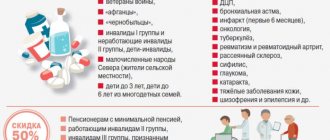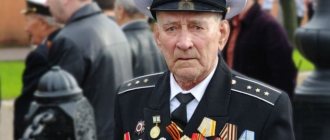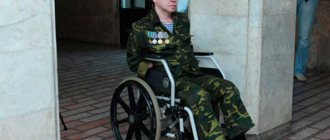A uniform law on state aid is in force throughout the Russian Federation. Benefits are provided, but, unfortunately, they are not available to all segments of the population. Federal beneficiaries include:
- war veterans;
- disabled war veterans;
- veterans of all military operations;
- military personnel who served during the Great Patriotic War;
- all family members of the above categories;
- the population affected by radiation release as a result of the Chernobyl accident;
- Heroes of socialist labor;
- prisoners of fascism;
- children with disabilities;
- disabled people with common diseases.
What prerogatives do people classified as federal beneficiaries have? All this information can be found in this article.
Benefits provided to federal beneficiaries
Most often, persons entitled to benefits receive certain advantages when paying for housing and communal services, medicine and free medicines; they may be provided with compensation for transportation costs, receive material benefits and various payments.
Those people who bravely defended the country rightfully deserve not only honor and respect, but also all possible assistance from the state.
Today, federal beneficiaries receive:
- the possibility of registering and receiving a double pension, namely upon reaching retirement age and for disability, upon medical examination. Veterans and blockade survivors have the right to receive additional financial support;
- those segments of the population, regarding federal beneficiaries, who do not have their own housing, can receive free accommodation from the state. According to the legislative framework of the Russian Federation, one single veteran is entitled to 36 square meters of living space, and if there are family members living with the beneficiary, they are entitled to 18 square meters for each family member;
- social support, these measures will be discussed in more detail in this article;
- all veterans and participants of the Great Patriotic War were given the right not to pay taxes on land, cars, and property taxes on one unit of each subject.
Self-employed citizen - who is he?
Also, a person participating in the development, extraction or sale of mineral resources is not recognized as a self-employed citizen. If you engage in this type of activity, without registration or a permit (license), you will be liable for illegal entrepreneurship.
- for remuneration received from the employer under an employment contract;
- interest and income received from transactions with securities, even if they were acquired through personal savings;
- on income received from the sale of real estate, even if they were used for the personal needs of a citizen;
- income from the sale of any movable things and objects, if they were previously used for personal, household and other non-commercial purposes;
- a number of other types of income, profit and earnings.
We recommend reading: Application for resignation at your own request, Article 77, paragraph 3, part 1
Social support for federal beneficiaries
This type of comprehensive benefits includes the following types of support:
- payment for housing and communal services provided and for the maintenance of existing housing is 50 percent of the regular cost;
- if it is necessary to connect a landline telephone, service is provided without a queue;
- free prosthetics for missing limbs, as well as dentures;
- special services in departmental medical institutions;
- if a federal benefit recipient is employed, he is entitled to extraordinary additional leave of up to 35 calendar days;
- this category of privileged persons is served out of turn in all public institutions, be it a store, a cash desk, a bank or other structures;
- the right to receive a place in a nursing home out of turn, as well as to help with housework from social workers.
This is a small contribution to the life of a needy person, but it still exists, because many of this category of beneficiaries were ready to give their lives for the land on which our people now live and prosper.
Benefits for disabled people
This category includes children with disabilities and disabled adults of all groups. Such residents of the country are provided with material payments, the size of which is directly dependent on the condition and degree of physical disability of the person.
The system of providing benefits can be divided into several groups:
- Submission form. For example, monetary benefits, free travel on passenger transport, free provision of necessary medications, and this also includes the opportunity to skip queues in public places.
- Division by frequency of provision. One-time assistance - for example, the service life of the electric meter has expired, it will definitely be replaced. Monthly – this may include a benefit for housing and communal services. Once a year – it is worth including trips on intercity transport, train tickets.
- For reasons that resulted in disability. This includes people with disabilities since childhood, disabled military personnel, disabled people from Chernobyl and others.
People with disabilities are provided with vouchers to health resorts and all other federal benefits.
Other categories of beneficiaries
In addition to veterans of the Great Patriotic War, there are combat veterans. This segment of the population also has the opportunity to receive federal benefits of the following nature:
- Housing and communal services, this includes the provision of free housing, benefits for paying for housing services;
- medicine, provision of services without a queue, the right to free treatment in hospitals, preferential prosthetics;
- payments, disability benefits resulting from hostilities, free sanatorium treatment, compensation for travel in suburban passenger transport.
The main differences between federal and regional beneficiaries
Federal beneficiaries include a list of the population for whom social assistance is provided in accordance with Federal laws, but regional beneficiaries receive benefits in accordance with the legislative framework of the constituent entities of Russia.
The main difference is the size of the budget from which the appropriate assistance is calculated.
The list of federal benefits is closed; adjustments can only be made by high-ranking government agencies. At the same time, regional benefits can be adjusted; subjects can independently make decisions and establish their benefits, without interference from the federal center.
In the final part of the article, we can say that the list of federal benefits provided is very extensive. In addition to social assistance, beneficiaries are provided with cash payments, such as EDV, DEMO, NSU. The state never ceases to forget its heroes, so in the near future the list of benefits provided may be increased.
The preferential category of Russians is determined by Federal Law No. 178 of July 17, 1999 “On State Social Assistance” with amendments and additions from 2011. There is a division, determined by the source of funding, into regional and federal entities in respect of which the right to financial assistance is secured. They have the advantage of receiving additional payments, social benefits and other material privileges.
List of federal beneficiaries
Article 6.1 of Chapter 2 of Federal Law No. 178 contains an exhaustive list listing federal beneficiaries. The corresponding privileges apply to the following persons:
- veterans of all military companies;
- former prisoners of fascism and concentration camps who were minors;
- all categories of disabled people, including those who received this status from the moment of birth;
- victims of the Chernobyl accident and those who received an excessive amount of radiation at other nuclear power plants.
The Pension Fund makes payments of funds in addition to the obligatory amounts to the listed entities in accordance with the expense item provided for by the federal budget and on the basis of relevant regulations. In addition, the persons indicated in the above article are entitled to state provision of special assistance.
Who is a disabled citizen and categories of dependents
1 tbsp. 1148 Civil Code). The second category includes dependents who are not heirs by law, but are fully supported by the testator and live with him for a year until the day of his death (clause 2 of Article 1148 of the Civil Code). If the above persons can be simultaneously called to inherit in order of priority and on the basis of dependency, then they receive the inheritance as representatives of the corresponding order or by right of representation. In addition, it is necessary to take into account that:
We recommend reading: Krasnodar region payments for 3 children in 2021
However, they are not considered heirs who can claim the inheritance. Therefore, they are considered equal to other heirs if they have been dependent for at least a year. In this case, the place of residence is not taken into account. In accordance with current legislation, in accordance with current legislation, heirs are citizens of the Russian Federation who are not included in the circle of persons listed in Articles 1142-1145 of the Civil Code.
Classification of benefits
The legislation provides for three main types of assistance
:
- package of social services;
- cash assistance;
- material support.
Taken together, these privileges are aimed at improving the financial and social conditions of an unprotected category of citizens.
NSO
Social services are an integral part of additional monthly payments. They are available in kind or monetary terms. The advantage of cash is partly due to the benefit monetization policy introduced in 2005. Under the program, benefits such as health resort treatment and medicines are replaced by cash and take-home pay. This allowed the privileged category of citizens to receive compensation for unused medical vouchers or purchased medications.
As of February 2, 2021, the size of the NSO in monetary equivalent is 1048.97 rubles. Most of it falls on the point of providing beneficiaries with medications and medicines. In the region, 10% goes to sanatorium-resort treatment, including vouchers to sanatoriums, and compensation for the cost of intercity transport to the place of treatment. In addition, transport benefits include the opportunity for beneficiaries to use railway transport for suburban travel (125 and 116 rubles, respectively).
The right to use NSO is distributed among several categories of entities
:
- beneficiaries in accordance with Article 6.1 of Federal Law No. 178;
- residents of Leningrad during the blockade of the city (with a confirmation sign);
- veterans and disabled people of all wars;
- military personnel who did not directly take part in the hostilities of the Second World War, but served in uncommitted units.
The right to NSO arises automatically upon receipt of EDV. An exception is made for citizens exposed to radiation under the circumstances specified in the law. This category of persons must submit an application for benefits.
DEMO
Certain categories of residents may receive additional funds from the national budget. The procedure is regulated by Federal Law No. 21 dated March 4, 2002 and Presidential Decree dated March 30, 2005. These regulations are devoted to procedural issues and features of providing assistance to the categories of citizens in question.
The amount of support is determined by the category of citizens entitled to benefits. For example, Heroes of the USSR, holders of the Order of Labor Glory and some other entities are entitled to assistance in the amount of 415%. The starting point for the calculation is the basic amount of social assistance. As this indicator increases, the monetary value of interest increases accordingly.
To receive assistance, you must provide a completed application form according to the established template, a passport and a document confirming the preferential category. DEMO is issued at the place of residence of the beneficiary.
EDV
Today, 16 million residents of the country are subject to legislation regulating the receipt of monthly additional payments. This indicates the relevance and expediency of benefits.
List of subjects
:
- military veterans;
- disabled people, including persons with limited physical capabilities since birth;
- persons exposed to radiation at any nuclear power plant;
- concentration camp prisoners who were under the age of majority at the time of the tragedy;
- heroes of the USSR and the Russian Federation, holders of the Order of Glory and Labor Glory, Heroes of Social. labor, as well as family members of citizens of this category who died in the line of duty.
If a citizen belongs to a preferential category for several reasons, payment will be made only for one of the points. The exception applies to citizens who received excessive radiation exposure as a result of an accident at a nuclear power plant. This provision is regulated by Federal Law No. 1244 of May 15, 1991.
For example, having the status of a concentration camp prisoner and disability resulting from other circumstances allow you to receive EDV only on the first or second basis. If a disability is received as a result of radiation at the Chernobyl nuclear power plant, the citizen has the right to double assistance.
List of documents required for registration
:
- passport;
- benefit document;
- compulsory insurance card;
- application of the established form.
The place of registration is determined by the registration of the beneficiary. Financial assistance is paid by the Pension Fund in territorial branches.
The EDV is subject to annual indexation in accordance with the inflation rate as of April 1 of the current year.
Conclusion
Federal benefits are a state guarantee of protection for socially vulnerable segments of the population. This is material and practical support, the purpose of which is to improve financial condition, provide necessary medications and provide conditions for treatment and transportation. EDV, DEMO and NSU are enshrined in federal regulations and apply throughout the country, regardless of the specifics of regional legislation.
These are disabled people of groups I, II, III, disabled children, war veterans and veterans, family members of deceased servicemen, citizens affected by radiation and man-made disasters. The main category of federal beneficiaries are disabled people of groups I, II, III.
Categories of citizens
4.1. Good afternoon Free land plot: who is entitled to it Russian legislation provides for only two cases when citizens have the right to receive land plots free of charge: It is possible to obtain ownership of plots already used by citizens for free; Also, certain categories of persons are entitled to free land. First group
, consisting of those who are entitled to land free of charge, includes: Citizens who actually use the land in perpetual exploitation or based on hereditary lifelong ownership.
Under such circumstances, citizens have the opportunity to obtain such a plot of land once without paying for it. There are also no fees when registering a plot. Citizens using a plot they received before the law “On Property in the USSR” came into force, if there is a residential building on it. Under these circumstances, citizens simply register ownership of the land. Citizens who own buildings, structures or structures with the right of indefinite use or lifetime ownership, who have the opportunity to freely register the plots on which these objects are located. The second group
,
which is entitled to free land, consists of the following citizens
: WWII veterans and members of their families who have lost their ability to work; Military personnel who have served under a contract for 10-15 years (each case is considered separately). These citizens may be provided with plots for the purpose of housing construction, as well as organizing farming activities; Persons serving in the internal affairs department for 15 years or more. This category can count on land for the construction of a residential building; Orphans and children left without the care of their parents. They have the right to claim the plot that was used by their parents. Nowadays, many citizens dream of small houses outside the city, however, even for their construction, the minimum that needs to be available is land. It is the issue of obtaining a plot for construction purposes that worries many categories of citizens.
We recommend reading: Sample commercial proposal for the provision of passenger transportation services
10. Excluded from the list of participants in the subprogram *Fulfillment of state. obligations to provide housing to categories of citizens established by the Federal Law*, explaining that there is no document confirming the right to be registered with housing, although all the documents were in the Federal State Institution SRUZHO of the Ministry of Defense of the Russian Federation.
What benefits were monetized to federal beneficiaries?
All benefits that were previously provided in kind were replaced by monetary compensation. Let's take people with disabilities, for example. Until 2005, they could ride public transport for free, receive a 50 percent discount when paying for a telephone, install dentures for free, in order of priority, or go to a sanatorium, etc. So, from January 1, 2005, all these benefits were replaced by a monthly a cash payment, after receiving which the beneficiary must pay for the services themselves.
But here it is important to note that some benefits are irrevocably replaced by monetary compensation, that is, the beneficiary cannot choose whether to receive these services in kind or in cash. These, in particular, include benefits for paying for a telephone, a collective antenna, travel on public transport and dental prosthetics. And part of the benefits, at the recipient’s choice, can be provided either in kind or in cash. This is the so-called set of social services (NSS), which includes medication provision, sanatorium-resort treatment, travel on suburban railway transport, as well as travel to and from the place of treatment. Moreover, it is precisely for these benefits that the legislator has determined the monetary equivalent. Why? So that in the case when a citizen refuses to receive these benefits in kind, he knows how much to compensate him in money.
The category of citizen is
From 03/11/2021, by decree of the Government of the Russian Federation dated 02/27/2021. No. 173, changes have been made to the Rules for the payment of monthly monetary compensation established by parts 9, 10 and 13 of Article 3 of the Federal Law “On monetary allowances for military personnel and the provision of individual payments to them” by Decree of the Government of the Russian Federation dated February 22, 2021 No. 142. These changes have added to the list of documents provided by the applicant. In particular, disabled people and family members of fallen (deceased) military personnel must provide a document confirming the receipt of a military injury during military service (military ID, certificate from the military commissariat, military medical documents, archival certificates). For a disabled person or a family member who simultaneously receives a pension from the territorial body of the Pension Fund of the Russian Federation and a pension from the pension body of the Ministry of Defense of the Russian Federation, the Ministry of Internal Affairs of the Russian Federation, the Federal Security Service of the Russian Federation and other bodies, monthly monetary compensation is assigned by the authorized body, subject to documentary confirmation that monthly monetary compensation is not paid by another body.
- those who became disabled due to the explosion on June 4, 1988 at the Arzamas-1 station, receiving a pension from the territorial bodies of the Pension Fund of the Russian Federation;
- disabled family members of the deceased who were dependent on the deceased on the date of death (June 4, 1988), receiving a pension from the territorial bodies of the Pension Fund of the Russian Federation.
We recommend reading: What does a decrease in gross and operating profitability mean?
How much of the monthly cash payment is for travel on public transport?
But it is impossible to give a direct and unambiguous answer to this, since the legislation does not define the monetary equivalent of those benefits that are clearly replaced by cash payments. As I have already said, the cash equivalent is established by law only for those benefits that can be provided either in kind or in cash. But for those who only use money, the legislator does not decipher it.
But, knowing which benefits are monetized, you can approximately (relatively, approximately) distribute this amount.
For example, let’s take a disabled person of group II. For this category, the monthly cash payment from 02/01/2018 is provided in the amount of 2701.67 rubles, it is distributed as follows:
The table shows that four benefits (unambiguously replaced by money) account for 1,580.26 rubles. If we subtract from this amount the cost of benefits for the telephone and antenna (50% telephone, maximum 206 rubles, this is if the unlimited tariff is 516 rubles, the antenna is about 100 rubles), 1172.09 rubles remain. (1478.09 – 206 – 100) for travel and dentures. Dentures are difficult to calculate and deduct; the service is, of course, expensive, but it is not used every month or even every year.
Here is an approximate (conditional) calculation.
It turns out that those citizens who are federal beneficiaries have been receiving monetary compensation for travel on public transport since 2005, while regional beneficiaries received this monetization only in November 2015?
It turns out that way. The benefit for paying for travel on public transport for federal beneficiaries has been monetized and is provided in the form of a monthly cash payment.
Social categories of citizens are
People, tell me this isn’t fair—there are already more people out of turn and first in line for kindergarten than everyone else. And the more you stand, the further your turn is. Well, why do the children of the Ministry of Emergency Situations, police officers, employees of the Ministry of Internal Affairs, investigators, prosecutors and judges go to the garden ahead of your child, while you still stand and wait for YOUR TURN. I’m not talking about socially vulnerable sections of the population and children of citizens who have special services to the Fatherland. I don't have many children, but I have two, and they... Continue reading →
We recommend reading: Land tax benefits for Chernobyl victims
08:2027.04.2021 (updated: 12:03 04/27/2021)2171092604671142 Lawmakers want to send those who evade employment for more than six months to correctional or forced labor for up to a year, writes Izvestia. Continue reading →
Main types of benefits: social, EDV, DEMO
| State aid | |||
| Social | Material | ||
| 1. Free medical drug treatment. 2. Providing food. 3. Resort recovery. 4. Free travel by municipal public transport. | EDV | DEMO | |
| The cash payment is intended for persons related to actions of a paramilitary nature, services to the Fatherland, and the Chernobyl disaster. If there are signs of several categories, finances are not summed up; the principle of the greatest benefit is applied. The choice of regulatory regulation is determined by the beneficiary himself. The amount of social benefits can reach from 2 to 5 thousand Russian rubles. | Additional material is intended for a specific circle of people. | ||
| 500 Russian rubles | 1000 Russian rubles | ||
| 1. Rear servicemen in the 41-45s. 2. Wives of those killed in the Finnish, Japanese, and WWII wars. 3. Concentration camp prisoners. 4. Residents of Leningrad during the siege. | 1. Disabled people and combatants. 2. Prisoners of the Great Patriotic War. | ||










